
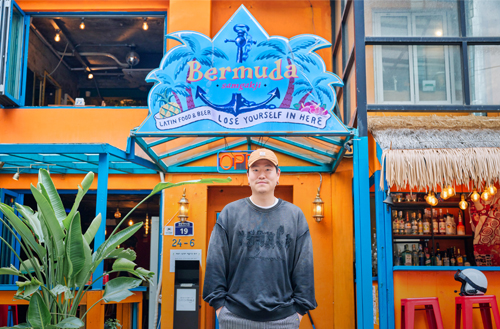
-
-
- 메일 공유
-
https://stories.amorepacific.com/en/amorepacific-meeting-sol-lim-the-owner-of-bermuda-samgakji
Meeting Sol Lim, the Owner of ‘Bermuda Samgakji’
A Culinary Hotspot in Yongridan-gil That Captured the Hearts of Millennials and Gen Z

On a quiet street in Sinyongsan, a restaurant stands out for its perpetually long queue. ‘Bermuda Samgakji,’ renowned for its fall-off-the-bone pork ribs and Mexican cuisine, has become the crown jewel of Yongridan-gil—a trendy restaurant district. Even during the height of social distancing measures, the establishment maintained a steady stream of patrons. AmoreStories sat down with Sol Lim, the owner of ‘Bermuda Samgakji.’
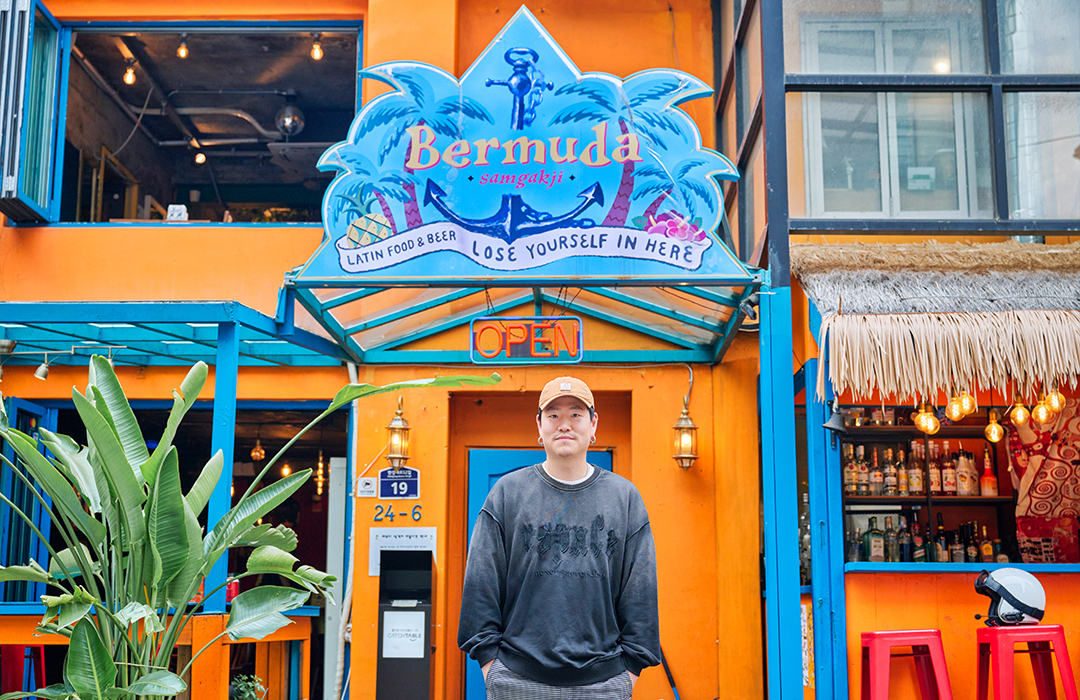
Owner Sol Lim in front of ‘Bermuda Samgakji’
A Fifteen-Year-Old Boy Dreams of Becoming Jamie Oliver
Was becoming a chef always your dream?
My culinary aspirations took root in middle school. I was captivated by Jamie Oliver’s cooking shows. Though I dreamed of attending a culinary high school, circumstances led me to a technical school instead. While the regular curriculum held little appeal, my passion for cooking remained strong. I was determined to study culinary arts in college, but this path required a special admission process for technical school students—and a chef’s license. I enrolled in a cooking academy and attempted the certification exam. Ten times, I failed. With just a month left before college entrance exams, I faced my final chance. It was do or die—without passing, my dreams of culinary school would evaporate. On my eleventh attempt, I finally succeeded.
Didn’t you feel discouraged after failing ten times? Did you ever question your talent?
Surprisingly, no. Until then, my only cooking experience had been at home—the academy was my first formal training. I expected it to be challenging. Whether I had natural talent or not, whether I excelled or struggled, I simply loved cooking. That was reason enough to persist. Even now, I don’t consider myself exceptionally talented. I do it because I love it.
What path did you take after graduating from culinary school?
I studied in the hotel culinary department, and my first job was also at a hotel. I started in the buffet section, where, as a newcomer, I was assigned to essential prep work—cooking rice, peeling fruits, and frying bacon. After six months of the same routine, I grew restless. While I understood newcomers typically start with menial tasks, I felt my skills weren’t developing as quickly as I hoped. That’s when I decided to leave for Singapore.
Why Singapore?
I knew very little about Singapore then. But I remembered my college professor describing it as a ‘culinary nation.’ Research showed that compared to European culinary destinations, Singapore offered much more affordable airfare and living costs. A tourist visa allowed a three-month stay, and I calculated living expenses would be around 4 million won. I borrowed money from my parents and left with just one goal: to secure a job within three months. All I had arranged was accommodation—everything else was up in the air.
Did you find work right away?
I spent the first-month submitting resumes through job sites but have not received a response. Then, I began visiting restaurants in person with my resume. My English was nonexistent—I’d memorized just one phrase: ‘I can work.’ I was too embarrassed to enter when I finally reached the restaurant where I wanted to work. I paced outside for two solid hours. Eventually, a chef came out. I rushed over to express my interest, but they couldn’t hire any more foreign workers—apparently, there were quotas. This pattern repeated for two months at various renowned restaurants, all with the same result. With just a month left on my visa, I was beginning to despair, wondering what I’d do back in Korea. Then, a hotel called, inviting me for an interview. The HR manager was hesitant due to my poor English, but the head chef saw something in my determination—running around with my resume showed a passion they were willing to take a chance on.
What was your role at the hotel?
I started in the breakfast service. Interestingly, unlike Korea, they didn’t assign prep work to newcomers. Instead, experienced chefs handled the ingredients. They told me, “We’ll handle this—you focus on learning the cooking in two weeks. Then it’s all yours.” I was handed a pan right away. They were probably short-staffed at the time, but I consider myself lucky. After two weeks, they put me in charge of the entire breakfast kitchen. There were about 20 breakfast menu items, most of which I’d never prepared before. Orders backed up, presentation was lacking, and complaints rolled in. I had no choice but to practice independently. I started arriving two hours early and staying four hours late, focusing on internalizing the recipes. After about three months, I developed my system in the kitchen. It was grueling at the time, but looking back, that experience was invaluable. It was the first time I pushed myself to create something. It gave me the confidence to handle any volume of orders, no matter how busy the restaurant got. After experiencing the hot kitchen, cold kitchen, and dinner service, I returned to Korea after a year and a half.
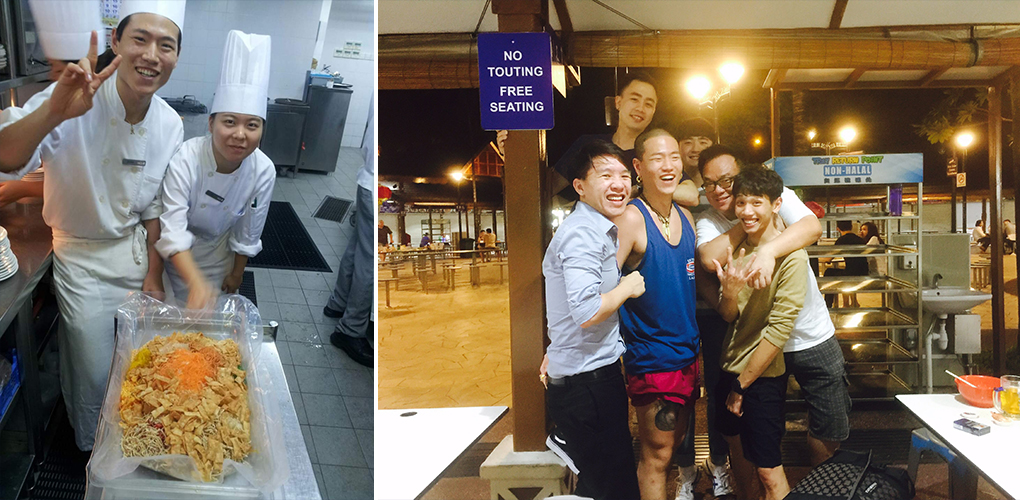
With colleagues at the Singapore hotel
Young Chefs Unite to Create ‘Bermuda Samgakji’
Did you return to Korea planning to open a restaurant?
It was the opposite. I wanted to quit cooking entirely. Singapore had been incredibly challenging. I’d been hurt by colleagues, battled homesickness, and, with my limited English, had no one to confide in. I’d developed an interest in fashion, so when I returned to Korea, I invested all my Singapore earnings in clothing retail. It didn’t work out. Then, a former hotel colleague contacted me about working at a skate fish restaurant. Being between jobs, I agreed.
How was working at the skate fish restaurant?
Everything was new and fascinating, from catching and preparing skates to explaining them to customers. The staff dynamic was great, too. The owner, a former hotel worker, suggested we were all too talented to remain employees. That’s how four of us from the skate restaurant came together to open the ’Bermuda Samgakji.’
Why did you choose Sinyongsan?
Sinyongsan had the most affordable rent among the locations we considered. We looked at Gyeongbokgung, Itaewon, and Yeouido, but Sinyongsan was significantly cheaper. At the time, it was primarily residential, with barely any commercial activity. The rent made sense, and we knew Amorepacific would return to the area in a few years, so we decided to set up here.

Early days of the ‘Bermuda Samgakji’
and Sol Lim at that time
You opened in 2015. How was business initially?
It was rough—barely breaking even. We started as a Mexican restaurant after learning recipes from a South American chef, but when business was slow, we kept adding different items. We’d serve anything that wasn’t available in the neighborhood. This left us without a clear concept—we became a restaurant without nationality. Naturally, customers were scarce. When we couldn’t recover our investment, some partners suggested selling. After careful consideration, I bought out their shares and began running the place with my wife.
What made you decide to take over a struggling restaurant?
When operating as partners, I needed a sense of real responsibility. I just worked for my share with little attachment to the place. I also leaned toward selling the place, but my wife suggested we try it. She believed we could turn it around, even during those difficult times. Without her, the ’Bermuda Samgakji’ wouldn’t exist today. She was a fashion designer but jumped into restaurant operations, handling everything from menu design to interior decoration and service. We renovated parts of the interior, added a cocktail bar where customers could watch drinks being made, and worked to create a more vibrant atmosphere.
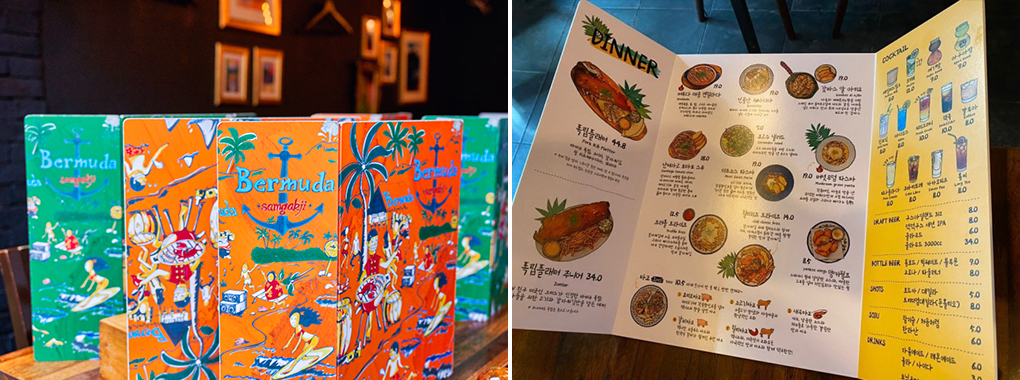
Menu designed by Mr. Lim’s wife

Renovated exterior and interior
Fortune Favors the Patient and Persistent
When did the lines start forming?
It began during the COVID period. As customer numbers gradually increased and lines formed, I wondered how people were finding us. The pork ribs probably played a significant role. When business was slow, we tried various things, and ‘the idea of serving pork ribs’ just came to me out of nowhere. Apart from a few family restaurants, only a few places served whole racks of ribs, and those that did were quite expensive.
I visited all the famous places, tasting their ribs and intensively researching recipes. I experimented with different temperatures and cooking times, trying various methods—baking, boiling, and other sauces. I was obsessed with finding subtle flavor differences between cooking methods. My wife ate nothing but ribs for three months. Finally, I discovered that sous vide cooking produced the most tender, delicious results. I immediately bought a sous vide machine.
Initially, we priced them in the 20,000 won range, though prices have increased slightly since then. The value for money drew excellent customer response. Developing the ribs coincided with Amorepacific’s return and the emergence of hip establishments like ‘Mongtan’ and ‘Hieutu,’ just as Yongridan-gil was becoming trendy. We benefited from the increased foot traffic. We were fortunate.
The ribs became your signature dish, then?
Yes, after the ribs’ success, we streamlined our menu to focus on ribs and Mexican food. Our ‘lack of concept’ had been our biggest concern. This allowed us to maintain our Mexican restaurant identity while featuring our famous ribs, finally establishing a clear direction.
If you had to recommend Bermuda Samgakji’s best-selling dishes?
If you can only try one thing, it has to be the pork ribs. When developing the recipe, my primary focus was on the meat’s tenderness—I calculated how much chewing should be required before swallowing. We sous vide at precisely the right temperature and time for optimal tenderness. I’m confident you won’t find ribs of this quality anywhere else at this price point.
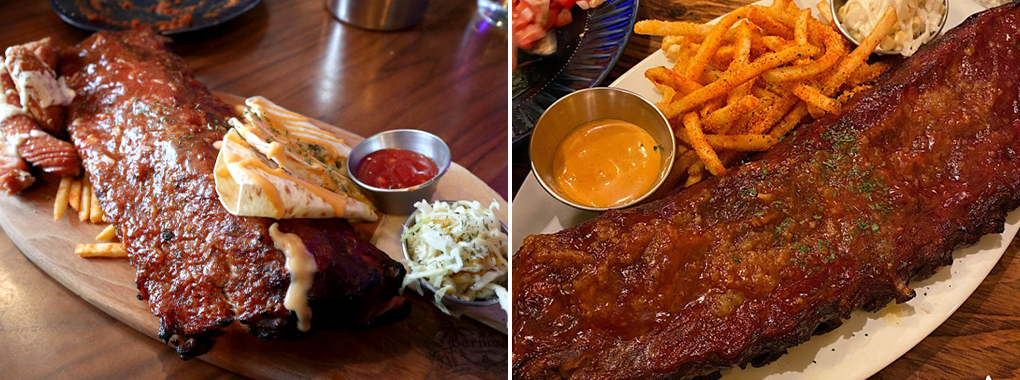
Bermuda Samgakji’s signature dish, pork ribs
My second recommendation is the ‘Mushroom Grave Pasta.’ I created it for my mushroom-loving wife, loading it with an enormous amount of mushrooms. She loved it so much that she suggested adding it to the menu. We gave it this playful name, and customers took to it. If you enjoy mushroom flavors, it’s a must-try.
Finally, there’s our enchilada—a Mexican dish in which tortillas are filled with cheese, vegetables, meat, or seafood and baked. We created a fusion version with Korean-style stir-fried pork and spicy rose sauce. People love its layered flavors—tangy, sweet, and savory all at once.
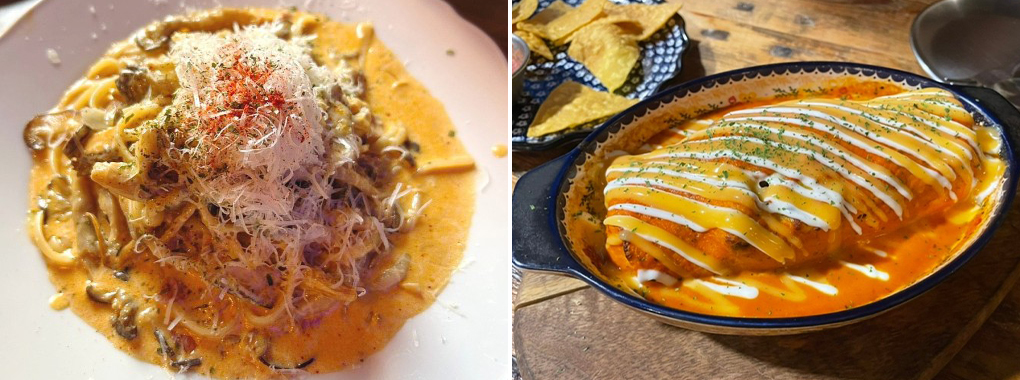
‘Mushroom Grave Pasta’ and enchilada
I heard you recently opened another restaurant in Sinyongsan.
Yes, a Singaporean restaurant called ‘Shiok.’ After returning from Singapore, I couldn’t even think about the place for a while—too many difficult memories. But somehow, we ended up honeymooning there. This time, it was completely different—I hadn’t realized how amazing the food was when I was working there. We started visiting Singapore frequently, and I decided to open a Singaporean restaurant. It felt like destiny—learning to cook there and returning for our honeymoon. After spending last year preparing, we opened in Sinyongsan early this year.
Is ‘Shiok’ as successful as ‘Bermuda Samgakji’?
It started incredibly well. Without any promotion, people somehow found us. I grew somewhat self-assured, thinking, ‘I must be good at this if it’s successful without marketing.’ Then sales started declining. That was humbling (laughs). It reminded me how challenging the restaurant business is and how little I know. Now, I’m focusing on the fundamentals again with more humility, and sales are improving. We started with authentic Singaporean recipes but have adjusted them slightly based on customer feedback to suit Korean tastes better. If you’re curious about Singaporean cuisine, please visit Shiok.
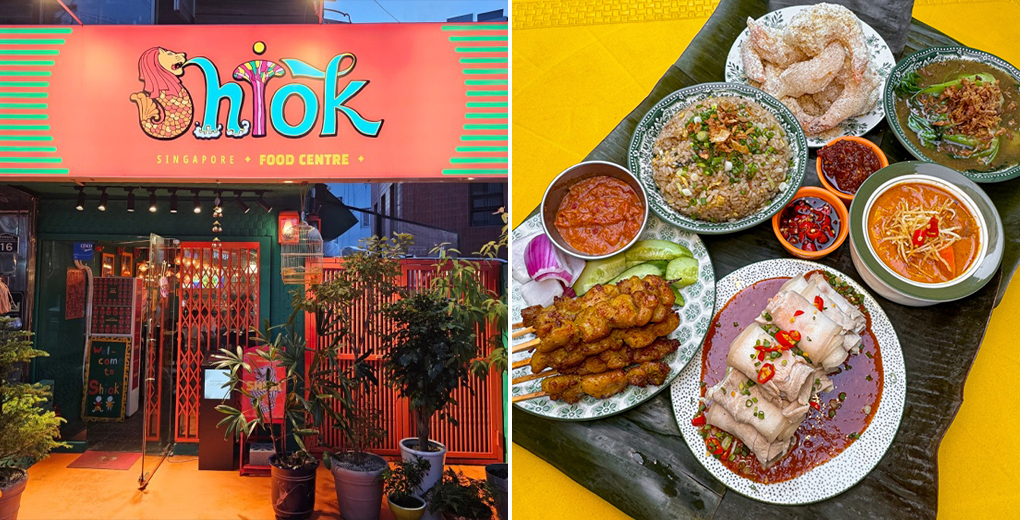
Singaporean restaurant ‘Shiok’ and its signature dishes
Finding Strength in the Lobster’s Story
What was your biggest crisis after opening?
Before COVID, sales hit rock bottom before we developed the ribs. That period was incredibly difficult. Working all day with my wife, we barely made enough to cover one person’s salary. But earning the same amount running your business feels different from achieving it as an employee—you’re tied to the restaurant all day. My wife worked through her pregnancy until full term, and even after giving birth, she’d serve customers with our baby strapped to her back. Every day was stressful. After our child was born, our worries grew. Money was so tight that my wife’s parents helped with diapers and formula for a while. My self-esteem plummeted, and I wondered if this was how we’d live forever. When I suggested giving up the restaurant, my wife convinced me to try for another year. She argued we’d invested too much to quit. Remarkably, things turned around within that year.
How did you manage your mental health during challenging times?
I tend to internalize stress rather than vent to others. I once heard a story about lobsters that stuck with me. Lobsters must shed their shells periodically as they grow, and it’s a complicated process. But after molting, they become much more robust than before. I thought about lobsters during tough times. Giving up meant the end, but if I persevered, I’d become strong enough to handle similar challenges easily in the future. This story always gave me strength when things got tough.
What principles did you maintain even when business was struggling?
My core belief was never to cut corners on ingredient costs or labor. Ingredients are everything in food—they make or break a dish’s taste. I’m constantly searching for suppliers of quality ingredients. As we got busier and needed more staff, labor costs became a concern, but I noticed that skimping on staff affected service quality. Customer service inevitably suffers when four people try to do five people’s work. I try to maintain staffing at about 150% of what seems necessary. When employees can work comfortably, it translates into better service for customers.
What has kept you going in the exact location for nearly ten years?
My wife’s support and belief in me, even during our most challenging times. After our children were born, my sense of responsibility as a family man grew more vigorous. There’s also the confidence from weathering ups and downs in this location for so long. This establishment won’t easily crumble now. That faith helps me face difficult periods with more resilience than before.
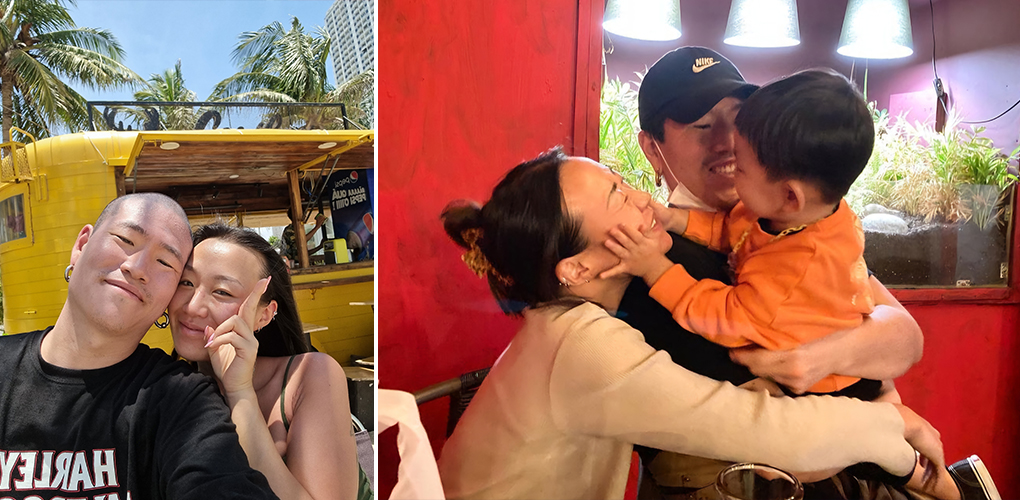
Enjoying happy moments with family, who are always supportive
What are the pros and cons of working with your spouse?
The main advantage is having someone to lean on during tough times. We understand each other’s situations perfectly. The downside is that because we’re physically close and comfortable with each other, we tend to take out our stress on each other. When we’re busy, tensions can run higher. When conflicts arise, I usually try to make the first move toward reconciliation.
Do you have any tips for those considering starting their own business?
I strongly recommend starting with a clear strategy for people like me who follow a conventional path and have average cooking skills. Self-employment means working almost seven days a week with no retirement pension or paid leave—it’s tough enough without making money. Whether planning, marketing, or something else, ensure you have a solid strategy before starting.
What’s your biggest concern currently?
While the business is doing well, I feel personally stagnant. Managing three locations, including our ingredients factory, means I always put out fires somewhere. Being constantly occupied with daily operations leaves little time to think about business growth. Seeing other talented chefs nowadays—continually innovating and building strong brands—sometimes makes me wonder, ‘What am I doing while they’re growing?’ When business struggled, I thought I’d be content just making decent money, but once you achieve that, you start comparing yourself to others. Now, I’m trying to embrace the idea that I’m different from others and should follow my path.
What’s your most recent proud moment?
We received an offer to do a pop-up at ‘The Hyundai Seoul.’ I hesitated initially, knowing pop-ups can be challenging, but I decided to try them for promotional purposes since ‘Bermuda Samgakji’ does little marketing. A famous franchise restaurant was doing a pop-up right next to us, drawing huge lines from the start. Our relatively quieter setup was initially discouraging. However, our sales were just a little behind. We’d created a system for immediate food service after ordering, which helped our turnover rate. Beyond the good sales, ‘proving’ ourselves was the most satisfying part. Initially, the department store was skeptical, questioning the ‘Bermuda Samgakji’ brand. However, the customer response was so positive that the internal feedback was excellent. We’ve been receiving steady collaboration offers and pop-up requests since then. I want to do more pop-ups when time allows.
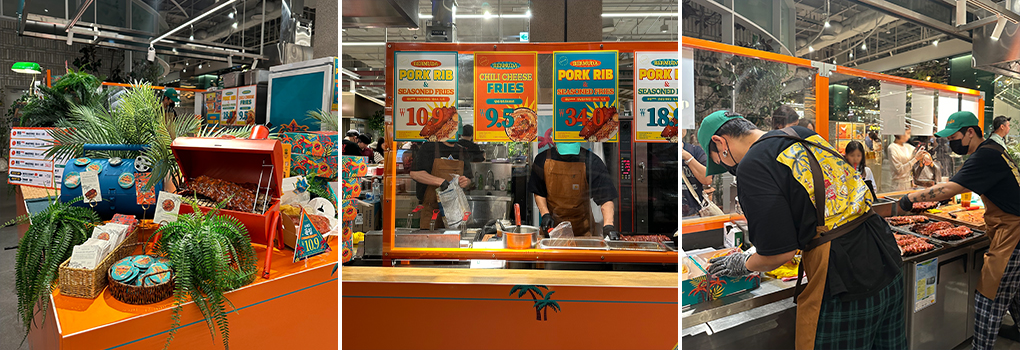
Pop-up store at the department store
Keeping Yongridan-gil’s Popularity Alive
What does Amorepacific mean to you?
After much thought about expressing it, I’d say it’s ‘fertile soil.’ Amorepacific cultivated fertile ground in what was previously a customer wasteland in Sinyongsan, allowing small businesses to plant their seeds and grow into strong trees. Bermuda Samgakji’s success and longevity in Sinyongsan owe much to Amorepacific. I’m always grateful.
How do you feel about Sinyongsan’s transformation, having witnessed it firsthand?
I attended high school in Yongsan, so I’ve seen this neighborhood’s evolution over a long time. It used to be quite shabby. Now, it’s thriving with significant companies like Amorepacific and a developed commercial district. My only wish is that Yongridan-gil maintains its appeal. Many areas lose foot traffic once their trendiness fades. I’ll keep working hard in my position to ensure people continue visiting Yongridan-gil.
What’s your happiest moment as a business owner?
We have about 15 employees now, and we had a party last Christmas. We played Secret Santa, enjoyed good food, and had a great time together. Seeing the staff’s joy made me happy, too. Watching employees enjoy themselves during workshops, parties, or small events makes me glad I chose this path.
Also, when customers leave saying, “That was delicious,”—it means so much. There was a time when I couldn’t even watch customers eat my food because I lacked confidence in my cooking. I was even afraid to read reviews. So when customers say such things now, it’s overwhelming and deeply touching. It makes me want to give them something extra for free.
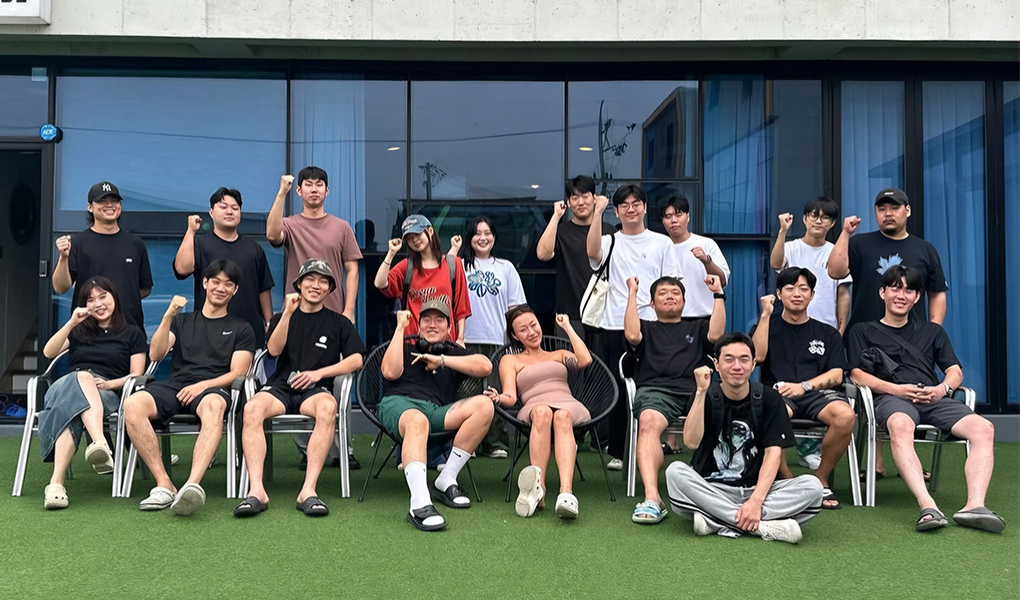
Workshop with employees
The ‘Culinary Class Wars’ cooking competition show has been popular lately. If you were to appear on it, what would you choose as your ‘life dish’?
Watching ‘Culinary Class Wars,’ I wondered if I could compete with those chefs. They’re incredible—I probably couldn’t win cooking with the same ingredients. So, I’d choose skate fish as my ingredient. It’s unique, and not many people know how to handle it. I could create something competitive with it, incorporating memories from my youth working at the skate fish restaurant.
What does happiness mean to you?
Spending time with family is my happiness. As I get older, I increasingly realize how precious family is. Despite my busy schedule, I spend as much time with them as possible.
What are your future plans?
I want to strengthen Bermuda Samgakji’s brand identity in Sinyongsan and open second and third locations in other areas, keeping the same name. Long-term, though it might sound idealistic, I’d love to run a Korean restaurant abroad. It might not be realistic, but hey, it’s a dream. (laughs).
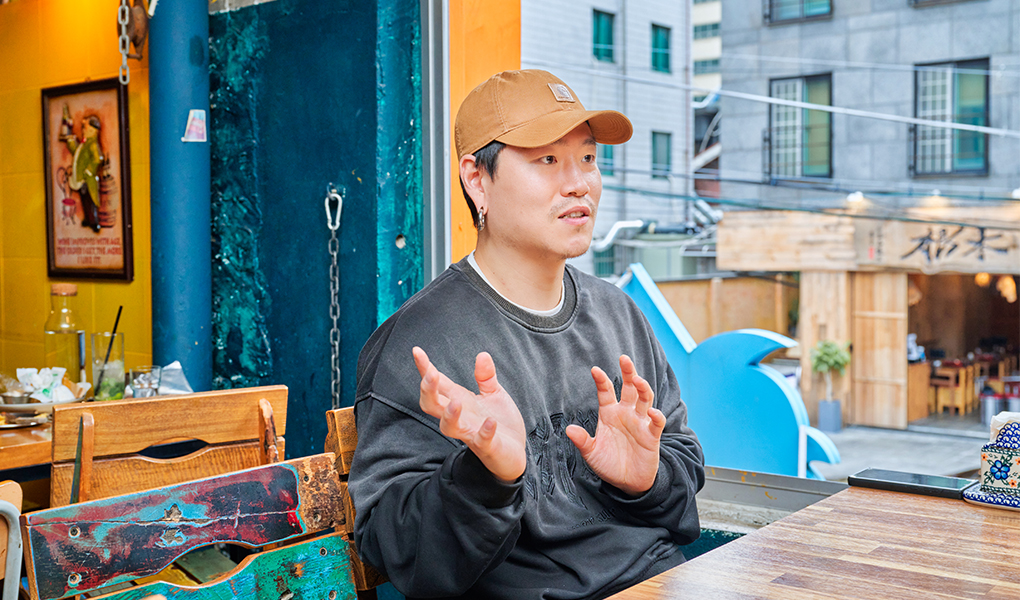
Sol Lim during the interview at ‘Bermuda Samgakji’
epilogue
When asked about the secret to his restaurant’s popularity, Lim humbly attributes it to ‘luck’ rather than his decade of perseverance or acclaimed cuisine. We hope his wish comes true—that the ’Bermuda Samgakji’ expands with second and third locations, further spreading the name of Sinyongsan.
‘100 Hangang-daero’ brings you interviews with business owners around Amorepacific, exploring the value and meaning of work through stories of passion, perseverance, and overcoming adversity.
Interview Hye-won Shin (Papervore)
Photos Design Mong
Planning Amorepacific Communications Team
-
Like
1 -
Recommend
1 -
Thumbs up
1 -
Supporting
1 -
Want follow-up article
1


